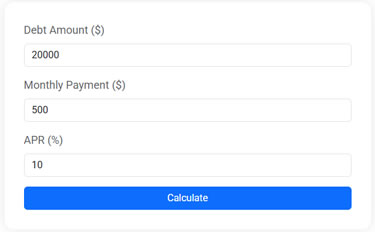Debt Management Tools to Help You Stay on Track

Managing debt can be made more manageable with the right tools and strategies, such as budgeting apps, debt repayment calculators, and consolidation services. These resources help streamline financial management, provide insights for informed decision-making, and simplify repayment processes. By leveraging tools like credit counseling and automated payment systems, individuals can create effective debt management plans and work towards financial freedom.
Managing debt can sometimes feel like trying to keep a dozen spinning plates from toppling to the ground. It’s a balancing act that many of us face at some point in our lives. Whether it’s student loans, credit card balances, or unexpected medical bills, debt can quickly become overwhelming. But here's the good news: with the right tools and strategies, you can take control and work towards financial freedom. Let’s explore some of these debt management tools that can help you stay on track.
While there’s no magic bullet to eliminate debt overnight, technology and expert advice have made it easier than ever to manage debt effectively. From budgeting apps that track every penny to debt repayment calculators that map out your journey to zero, these resources can transform how you handle your finances. Let's dive into the specifics of these tools and see how they can make a real difference in your financial life.
Budgeting Apps: The Foundation of Debt Management
Budgeting apps are like the Swiss army knife of personal finance. They provide a comprehensive overview of your income and expenses, helping you identify areas where you can cut back and save more. Apps like Mint and YNAB (You Need A Budget) are particularly popular because they sync with your bank accounts and categorize your spending automatically. This visibility is crucial when you're trying to find extra funds to put towards debt repayment.
Take Jane, for instance, a teacher who found herself struggling with credit card debt. By using a budgeting app, she was able to see that her monthly coffee shop visits were costing her over $100. By cutting back and making her own coffee at home, she freed up more money to pay down her debt faster. As financial advisor Dave Ramsey often points out, "You must gain control over your money, or the lack of it will forever control you."
Debt Repayment Calculators: Mapping Your Path to Zero
Once you’ve got a handle on where your money is going, the next step is to create a plan for paying down debt. Debt repayment calculators are invaluable for this. By inputting your debt amounts, interest rates, and monthly payment capabilities, these calculators can show you the quickest way to become debt-free.
For example, the Snowball Method calculator focuses on paying off your smallest debts first to build momentum, while the Avalanche Method calculator tackles high-interest debts first to save you money in the long run. Both methods have their merits, and the best choice depends on your personal financial situation and psychological preferences. According to a study by the Harvard Business Review, individuals who use the Snowball Method often feel more motivated due to the early wins, even if the Avalanche Method might save more in interest over time.
Debt Payoff Calculator
Plan your financial future by estimating how long it will take to pay off your debt based on your balance, annual percentage rate (APR), and monthly payment. After entering your figures, the calculator determines the number of months needed to fully repay the debt and calculates the total interest paid over time.
Debt Consolidation Services: Simplifying Your Payments
If you’re dealing with multiple debts, it might be worth considering debt consolidation services. These services combine your various debts into a single payment, often with a lower interest rate. This can simplify your financial life significantly, as you’ll only have to keep track of one due date each month.
However, consolidation isn’t for everyone. It’s important to ensure that the new terms are favorable and that you’re not just trading one form of debt for another. As CNBC notes, "Debt consolidation can be a useful tool, but it must be part of a broader strategy to manage debt effectively." Always read the fine print and consult with a financial advisor if you’re unsure.
Credit Counseling: Professional Guidance When You Need It
Sometimes, managing debt on your own can feel daunting. This is where credit counseling comes in. Credit counseling agencies offer professional advice and can help you create a customized debt management plan. They often negotiate with creditors on your behalf to improve the terms of your debt.
Mary, a small business owner, found herself overwhelmed after a tough year. A credit counselor helped her prioritize her debts and negotiate lower interest rates, which provided her with much-needed breathing room. Remember, seeking help is a sign of strength, not weakness. As financial expert Suze Orman says, "People first, then money, then things." Taking care of your financial well-being is paramount.
Automated Payment Systems: The Power of Set-It-and-Forget-It
One of the easiest ways to ensure you never miss a payment is by setting up automated payment systems. Most banks and financial institutions offer this service, allowing you to schedule regular payments towards your debts. This not only helps you avoid late fees but also ensures that your payments are consistently made on time, which is crucial for maintaining a healthy credit score.
A friend of mine, Tom, used automation to pay off his student loans aggressively. By setting up automatic payments above the minimum amount, he managed to pay off his loans five years early, saving thousands in interest. Automating payments takes the guesswork out of the equation and keeps you on track.
Final Thoughts: Your Journey to Financial Freedom
Debt management is a journey, not a sprint. It requires discipline, patience, and the right set of tools. Whether you’re using budgeting apps to track your spending, debt calculators to plan your repayment strategy, or seeking professional help through credit counseling, remember that you’re not alone. Millions of people are on the same path, and with determination and the right resources, financial freedom is within reach.
As you explore these debt management tools, keep in mind that the ultimate goal is to create a sustainable financial plan that works for you. Personal finance is personal, after all. So, find what fits your life, stick with it, and watch as those spinning plates begin to stabilize. Here’s to your journey towards a debt-free future!








